class: center, middle, inverse # Writing PHP *framework-agnostic* code : today and tomorrow --- class: center, middle # *Framework-agnostic* # = # .highlight1[Independent from the framework] --- # David Négrier - <img alt="TheCodingMachine" src="images/tcm-black.png" style="width: 15%"> Co-founder and CTO - <img alt="Mouf" src="images/mouf.png" style="width: 5%"> Lead developer - <img alt="Mouf" src="images/packanalyst.png" style="width: 2%"> **Packanalyst** Lead developer - container-interop and **PSR-11** co-editor .large-img[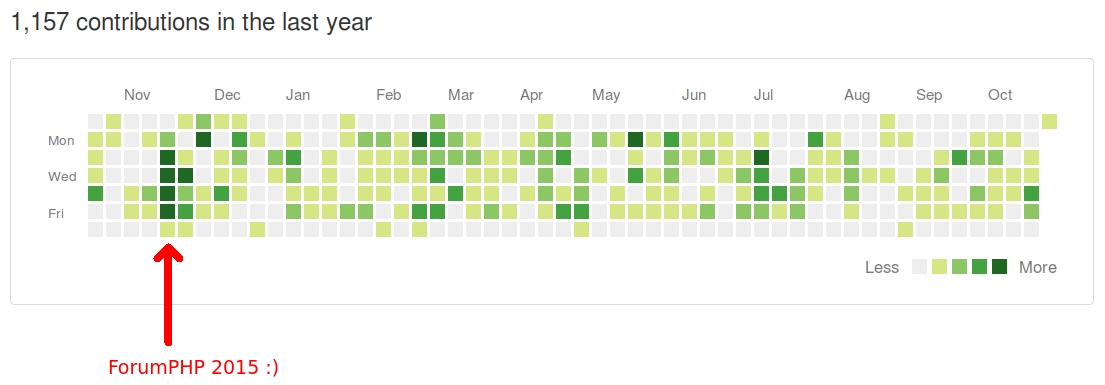] --- class: center, middle # *framework-agnostic* code... # What for? ??? In this talk, we will speak about framework-agnostic code, that is code that is independent from your framework. So the first question you might ask is what for? You're going to tell me: hey David, your stuff seems difficult here, I'd rather write a Symfony bundle. --- class: center, middle # Your enemy: .highlight2[fragmentation] ??? We all have a common enemy: fragmentation. This fragmentation is a problem for framework authors, for package developers or even if you are a simple application developer. --- class: middle ## - I am an open-source package developer # .center[Fragmentation is .highlight2[my enemy]] ??? Let's say I'm developing a Symfony bundle... or a Wordpress module, or a Drupal plugin, or a Zend Framework module... Each time I do this, I become a Symfony developer, or a Wordpress developer... My PHP package looses a potential much wider audience: the audience of all PHP developpers. For an open-source package developers, fragmentation means a lesser audience for my code. --- class: middle ## - I am an open-source package developer ## - I am a framework author # .center[Fragmentation is .highlight2[my enemy]] ??? Hey! Come on guys! I built this brand new framework, it rocks! Chances this will succeed? 0 Because all the developers of the community are focused on building Symfony bundles or Wordpress modules.Parce que tous les développeurs de la communauté sont occupés à faire des bundles Symfony ou des modules Wordpress. Conclusion: that's less competition, so less innovation. And even for well established frameworks, this is harmful since they have to fight against themselves with each new major release (see Drupal 7 to Drupal 8 migration!) --- class: middle ## - I am an open-source package developer ## - I am a framework author ## - I am a developer and I use a framework # .center[Fragmentation is .highlight2[my enemy]] ??? Same problem. You cannot use a module from a competing framework. Furthermore, if your own code is too tied to the framework, will be hard to migrate. So all of us are concerned by the fragmentation of the ecosystem issues. In this talk, I'll focus on the first case, so I'll ask you to do as if you were a PHP open-source package developer. Out of curiosity, how many of you have a Github account that you used on an open-source account? --- class: center, middle # Congratulations! You did it! You wrote your first PHP package! --- background-image: url(images/kermit_keyboard.gif) background-position: center background-repeat: no-repeat background-size: contain --- class: center, middle # I'm gonna share it with the whole wide world!   --- background-image: url(images/kermit_happy.gif) background-position: center background-repeat: no-repeat background-size: contain --- class: center, middle # 2 possible cases --- class: center, middle # Case 1: my package is dead simple --- ## friendsofjs/leftpad ```php namespace So\Useful; class Utils { public static function leftPad($string, $length, $filler = ' ') { return str_pad($string, $length, $filler, STR_PAD_LEFT); } } ``` --- ## friendsofjs/leftpad 1. I put my package in any project ``` composer require friendsofjs/leftpad ``` 2. I use it... success! ```php echo Utils::leftPad('42%', 4); // " 42%" ``` --- class: big-text ## friendsofjs/leftpad <p> </p> <p> </p> <p> </p> <p> </p> .center.middle[This package is already *framework agnostic*, thanks to **Composer** and **PSR-4** (autoload).] --- class: big-text ## friendsofjs/leftpad <p> </p> <p> </p> <p> </p> <p> </p> .center.middle[But not very useful...] --- class: center, middle # Case 2: My package is more complex --- ## l33t/weatherapi .full-width[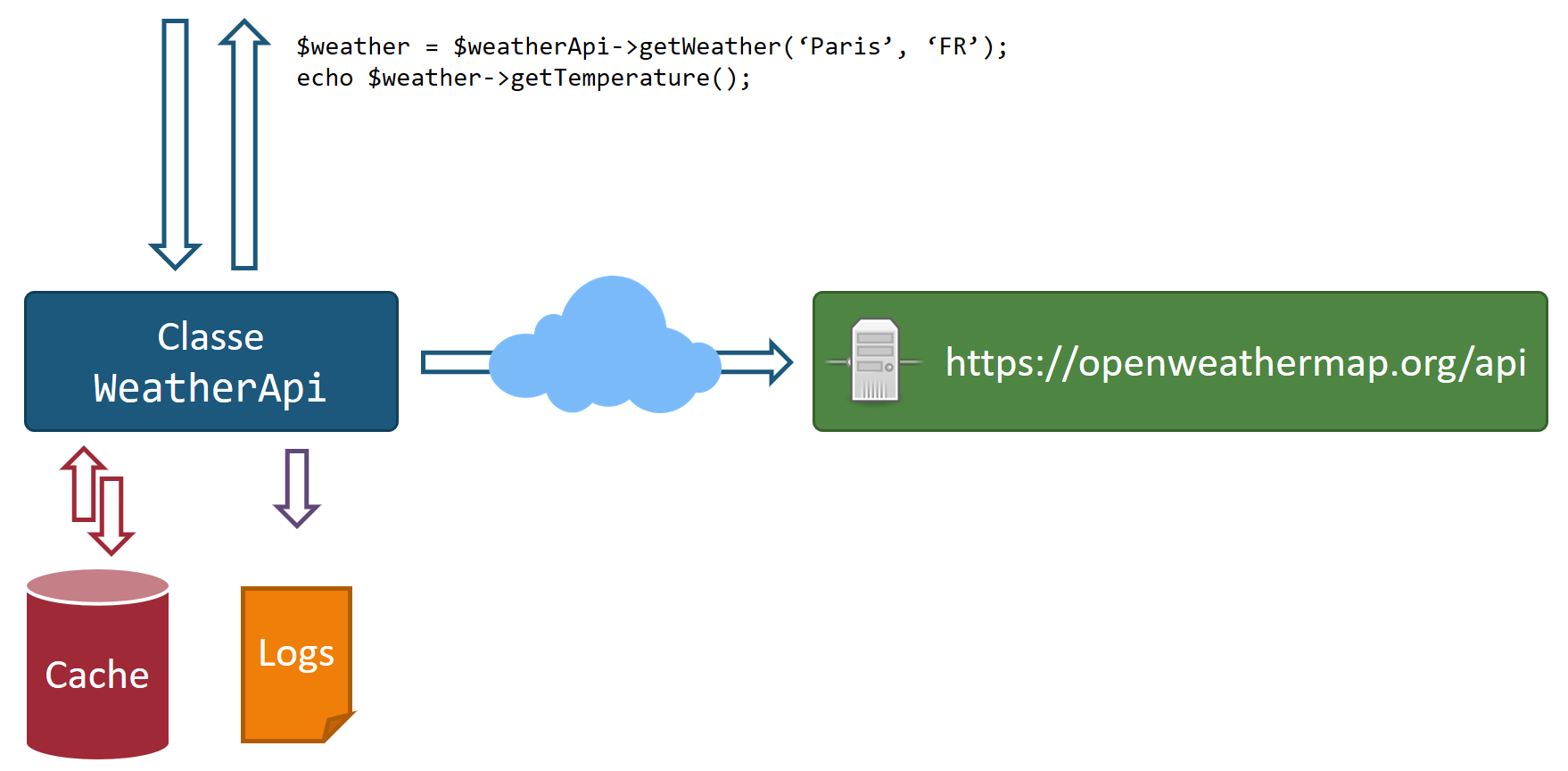] --- class: center, middle, big-text Ok, so I need an HTTP client to perform this request... --- class: center, middle, big-text - curl? ??? Curl? But management of errors is sooooo hard... (no exceptions...) --- class: center, middle, big-text - Guzzle? --- class: center, middle, big-text - Guzzle 5? - Guzzle 6? ??? I'd like to use the latest version of Guzzle, but I have this old project that uses Guzzle 5 and I won't be able to use my new package in my old project without first migrating Guzzle... damn! --- class: center, middle, big-text - Zend-HTTP? --- class: center, middle, big-text - React HTTP client? --- background-image: url(images/kermit_groumpf.gif) background-position: center background-repeat: no-repeat background-size: contain --- class: center, middle, big-text And I need a library to manage logs too! --- class: center, middle, big-text - `fopen`, `fwrite`? ??? But what if I want to log to something else than a file? --- class: center, middle, big-text - Monolog? --- class: center, middle, big-text - cakephp/log? --- class: center, middle, big-text - joomla/log? --- class: center, middle, big-text - vespula/log? --- background-image: url(images/kermit_think.gif) background-position: center background-repeat: no-repeat background-size: contain --- class: center, middle # Stop! --- class: center, middle ## You should avoid depending on a particular .highlight2[implementation]. ## Whenever it is possible, prefer an .highlight1[abstraction]. --- # We would need a black box... .large-img[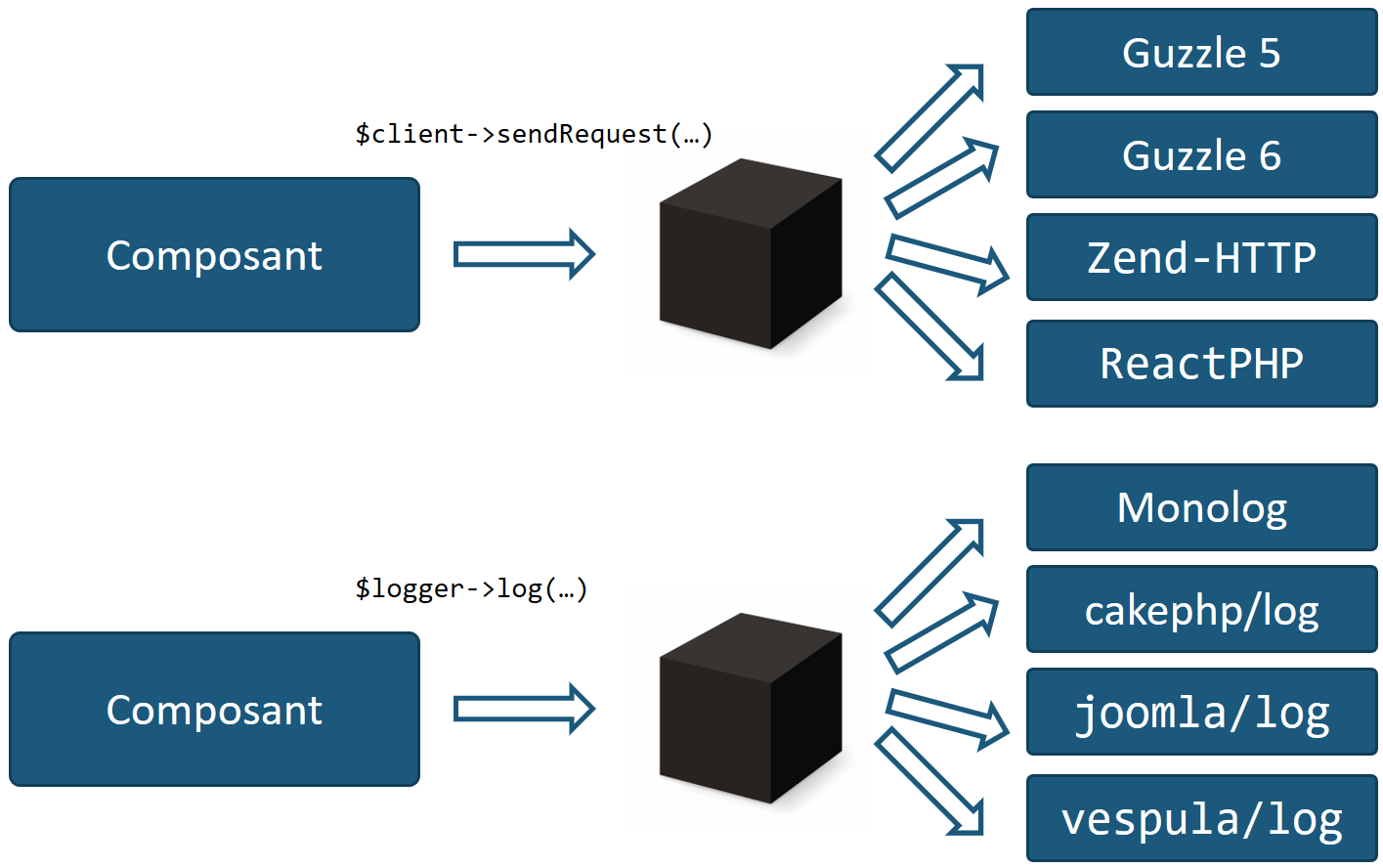] --- class: center, middle ## In OOP: # .highlight1[Abstraction] # = # Black box # = # .highlight3[Interface] --- # HTTPlug ```php interface HttpClient { /** * Sends a PSR-7 request. * * @param RequestInterface $request * * @return ResponseInterface * * @throws \Http\Client\Exception If an error happens during processing the request. * @throws \Exception If processing the request is impossible (eg. bad configuration). */ public function sendRequest(RequestInterface $request); } ``` --- # PSR-3 ```php interface LoggerInterface { /** * Logs with an arbitrary level. * * @param mixed $level * @param string $message * @param array $context * * @return void */ public function log($level, $message, array $context = array()); public function emergency($message, array $context = array()); public function alert($message, array $context = array()); public function critical($message, array $context = array()); public function error($message, array $context = array()); public function warning($message, array $context = array()); public function notice($message, array $context = array()); public function info($message, array $context = array()); public function debug($message, array $context = array()); } ``` --- # We need interfaces! .large-img[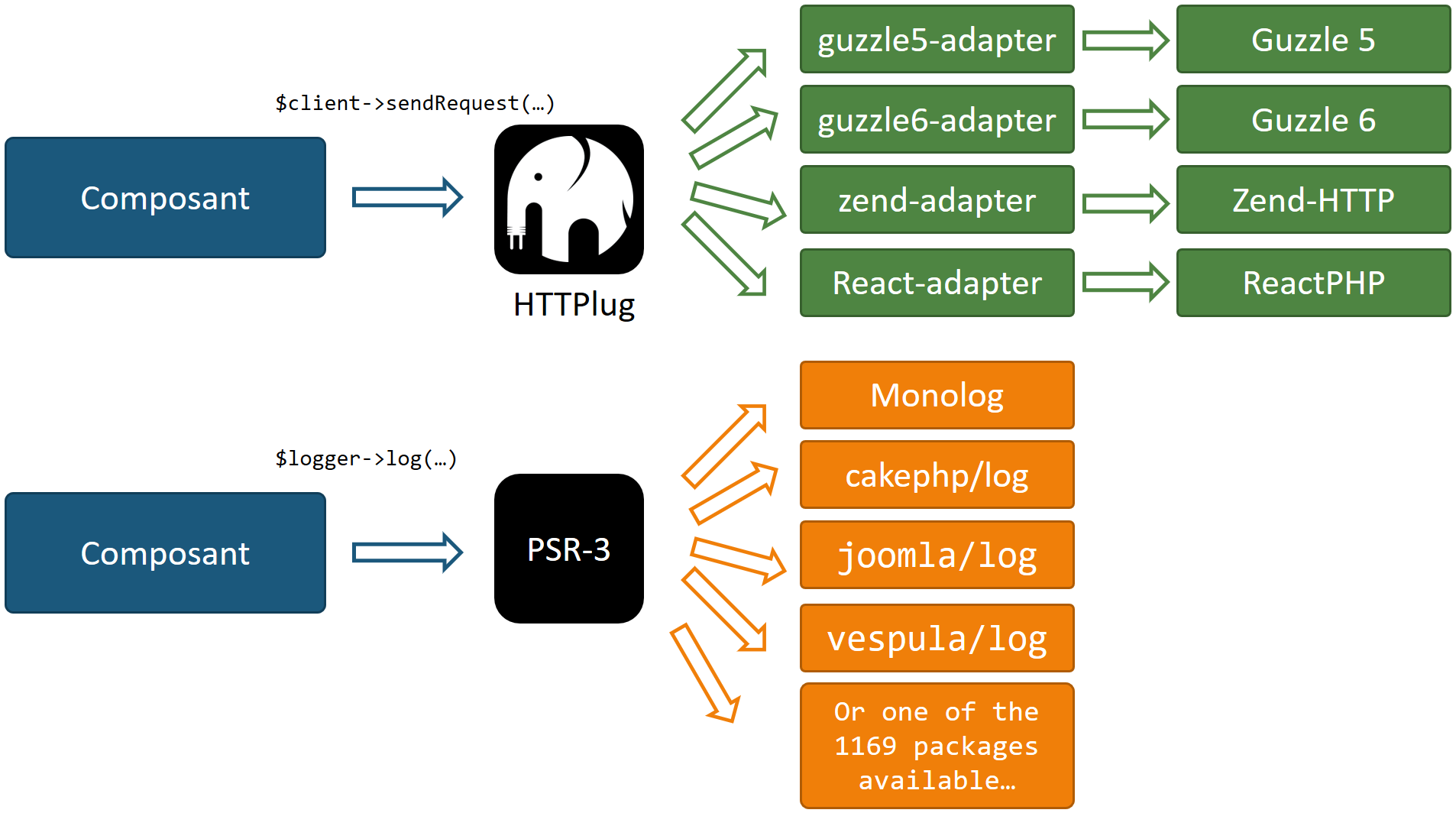] --- # l33t/weatherapi **composer.json** ```json { "name": "l33t/weatherapi", "require": { "php-http/client-implementation": "^1.0", "psr/log": "^1.0", "psr/cache": "^1.0" } } ``` --- class: center, middle, big-text If I want to use interfaces, .highlight2[I'm not in charge] of creating object instances. ??? Remember: if my component sees a black box, it means that my component does not know who it is talking to. It cannot be responsible for instantiating a logger or a cache service, or a HTTP client. But if I don't have an implementation, how do I write my package? --- ```php namespace L33t\WeatherApi; use Http\Client\HttpClient; use Psr\Cache\CacheItemPoolInterface; use Psr\Log\LoggerInterface; class WeatherApi { private $httpClient; private $logger; private $cache; private $apiKey; public function __construct(HttpClient $httpClient, LoggerInterface $logger, CacheItemPoolInterface $cache, string $apiKey) { $this->httpClient = $httpClient; $this->logger = $logger; $this->cache = $cache; $this->apiKey = $apiKey; } public function getWeather(string $countryCode, string $cityName) : Weather { // Do stuff... } } ``` ### Pro-tip: this is what we call "dependency injection" --- background-image: url(images/kermit_yay.gif) background-position: center background-repeat: no-repeat background-size: contain --- class: center, middle, inverse # Interlude: interoperability cartography --- # Typical components in a framework .very-large-img[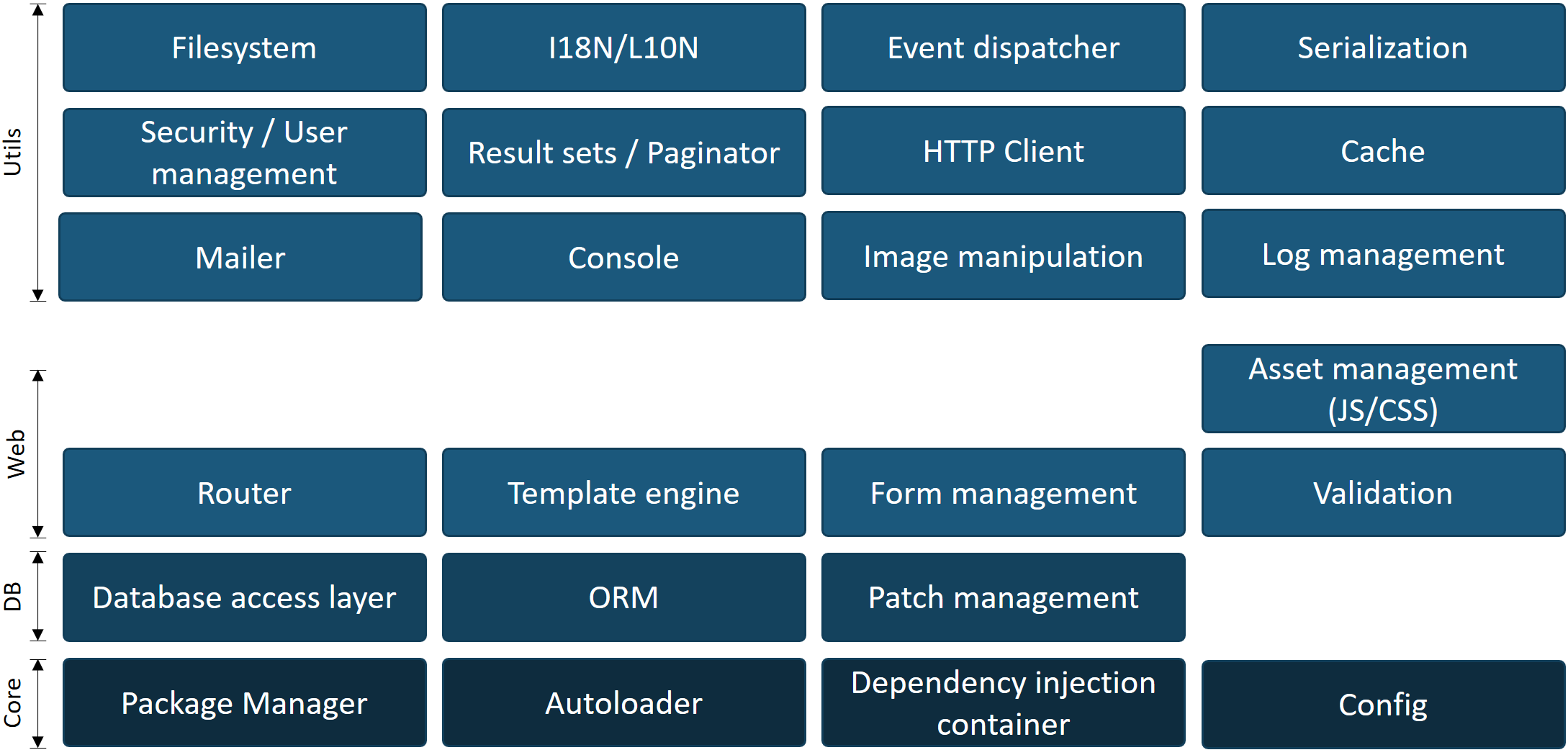] --- # Typical components in a framework .very-large-img[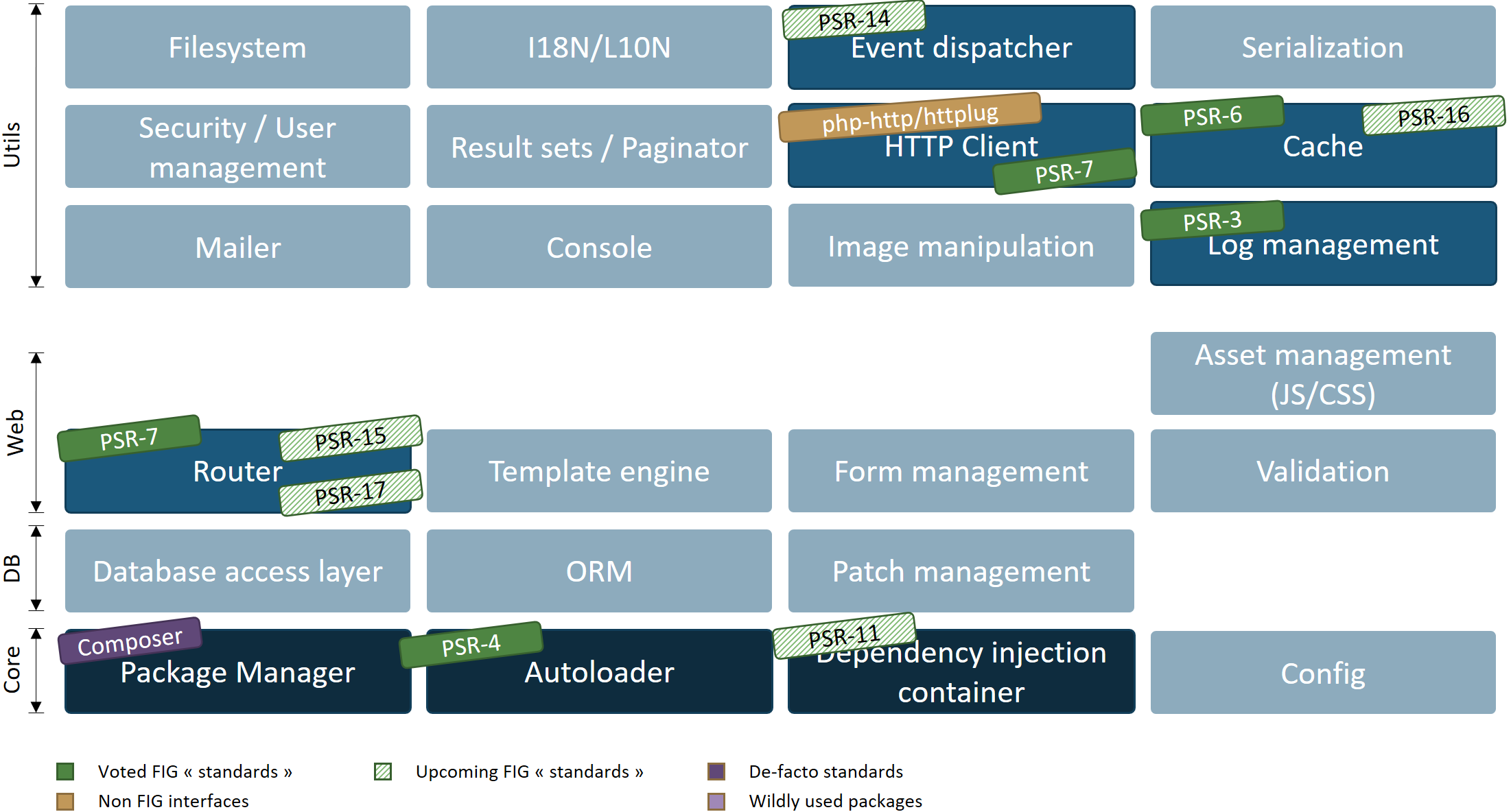] --- # Typical components in a framework .very-large-img[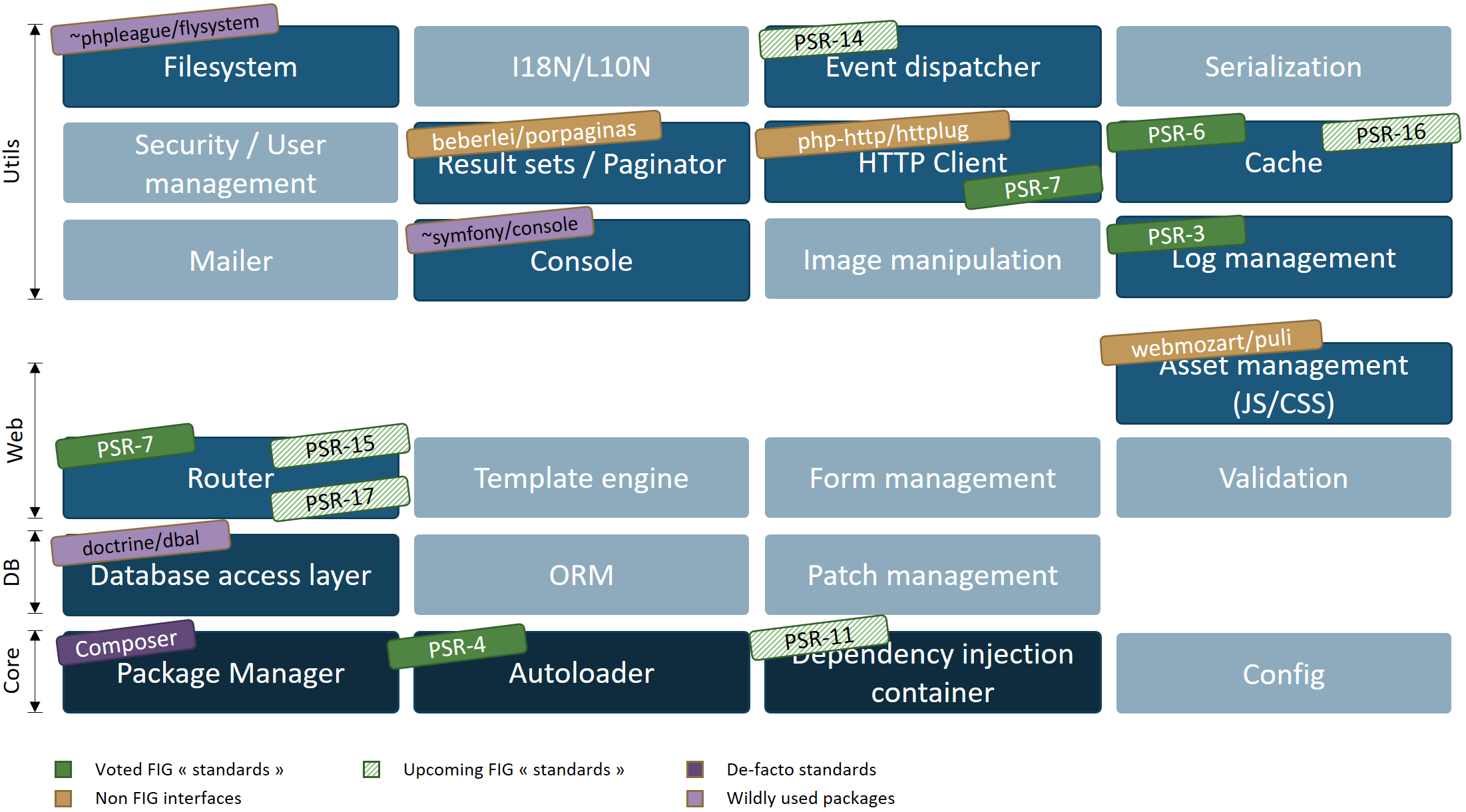] --- # Typical components in a framework .very-large-img[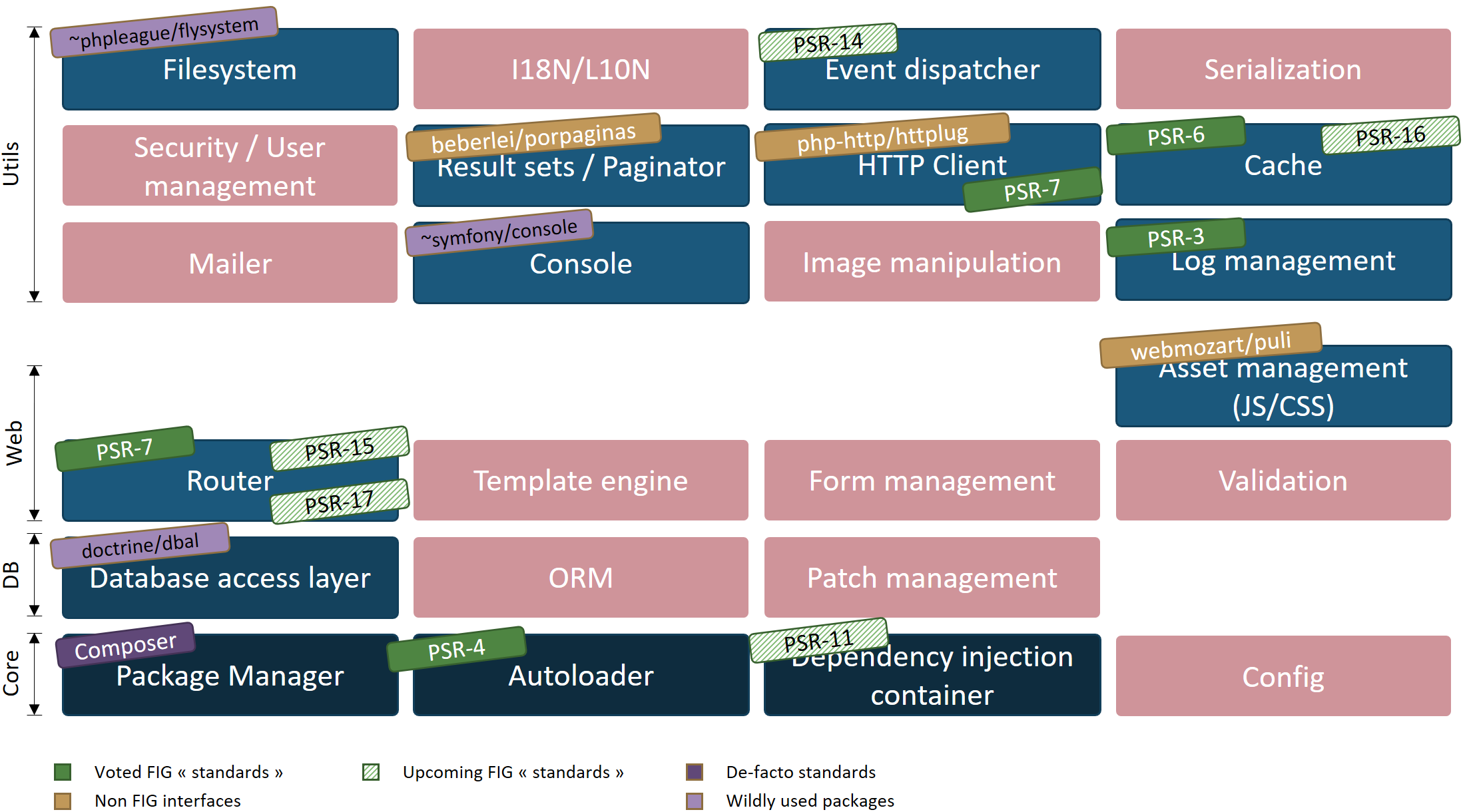] ??? Mettre l'accent sur les manques, notamment l'absence d'interface pour le rendering => si j'ai un composant dans une page web que je veux intégrer dans un template, je ne sais pas comment faire. --- class: center, middle, inverse # End of interlude: back to L33t/WeatherAPI --- class: center, middle ## .highlight2[I'm not in charge] of creating object instances. --- class: center, middle ### If .highlight2[I'm not in charge] of creating object instances... # .highlight1[who is in charge???] --- class: center, middle  # .highlight2[The user of my package!] --- So I moved a part of the complexity of the code **to the user** of my class. **composer.json** ```json { "require": { "l33t/weatherapi": "^1.0", "guzzlehttp/guzzle": "^6.0", "php-http/guzzle6-adapter": "^1.1", "monolog/monolog": "^1.9", "tedivm/stash": "^0.14" } } ``` **file.php** (the *glue code*) ```php $guzzle = new GuzzleClient([]); $httplugAdapter = new GuzzleAdapter($guzzle); $logger = new Logger('my_logger'); $logger->pushHandler(new StreamHandler(__DIR__.'/my_app.log', Logger::DEBUG)); $driver = new Stash\FileSystem(); $cache = new Stash\Pool($driver); $weatherApi = new WeatherApi($httplugAdapter, $logger, $cache); $weather = $weatherApi->getWeather('fr', 'Paris'); ``` ??? Now, it is the responsibility of the user to know what packages he must import. In particular, it's his responsibility to create the instances of the objects (and hence to know how to use each library he chooses). So what does this glue code contains? => adapter classes (supposed to disappear with PSRs) => container configuration --- class: center, middle, big-text In real life, each .highlight1[service] is in fact configured in and fetched from the .highlight1[dependency injection container]. --- class: center, middle, big-text In real life, the user is .highlight1[lazy] and does not like to configure the DI container. --- class: center, middle, big-text In real life, the user .highlight1[uses a ready to use module] to inject services in the container. --- class: center, middle ## It is .highlight1[your responsibility] to be nice to your users and to offer him/her a module. --- ## l33t/weatherapi + associated modules .large-img[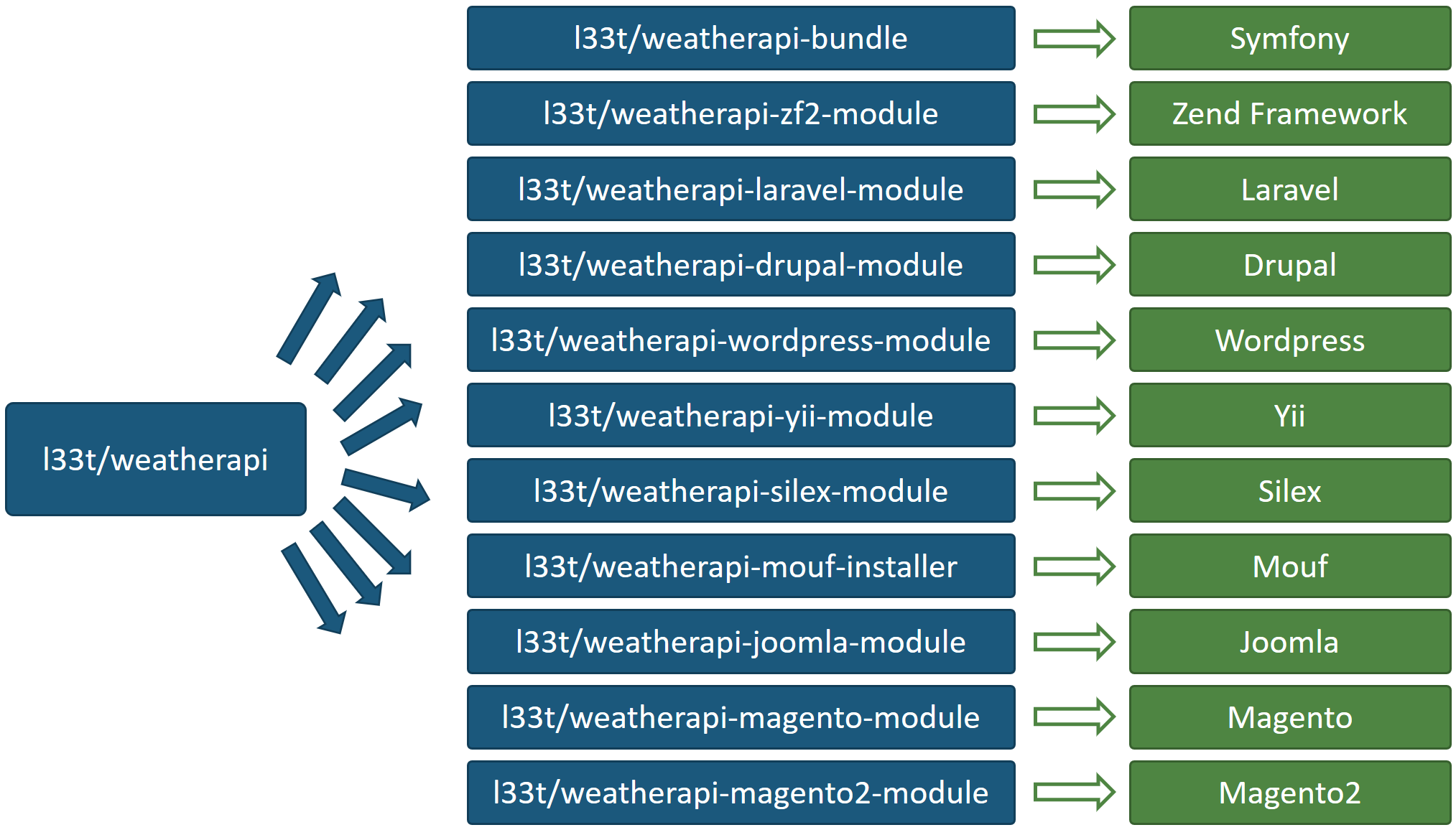] --- class: center, middle ## It is .highlight2[your responsibility] to know all those frameworks! ??? => for big packages => it is the framework author responsibility to write the glue code (cf Doctrine) => most of the time, it is the responsibility of the author of the package. --- background-image: url(images/kermit_water.gif) background-position: center background-repeat: no-repeat background-size: contain --- class: center, middle <img src="images/packagist.png" style="width: 55%" /> --- class: center, middle, inverse # And tomorrow? --- # Now .large-img[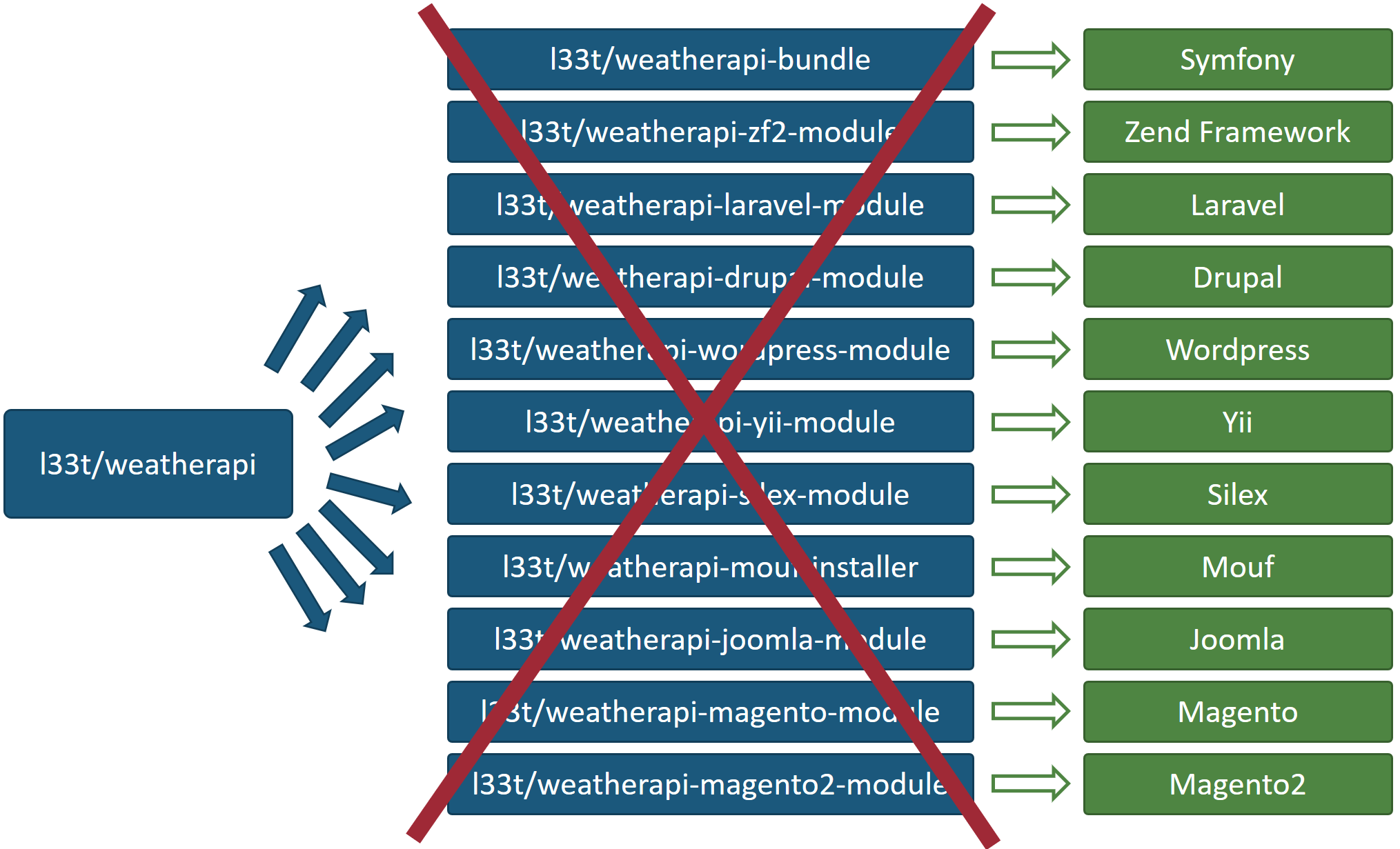] --- # Ideally .large-img[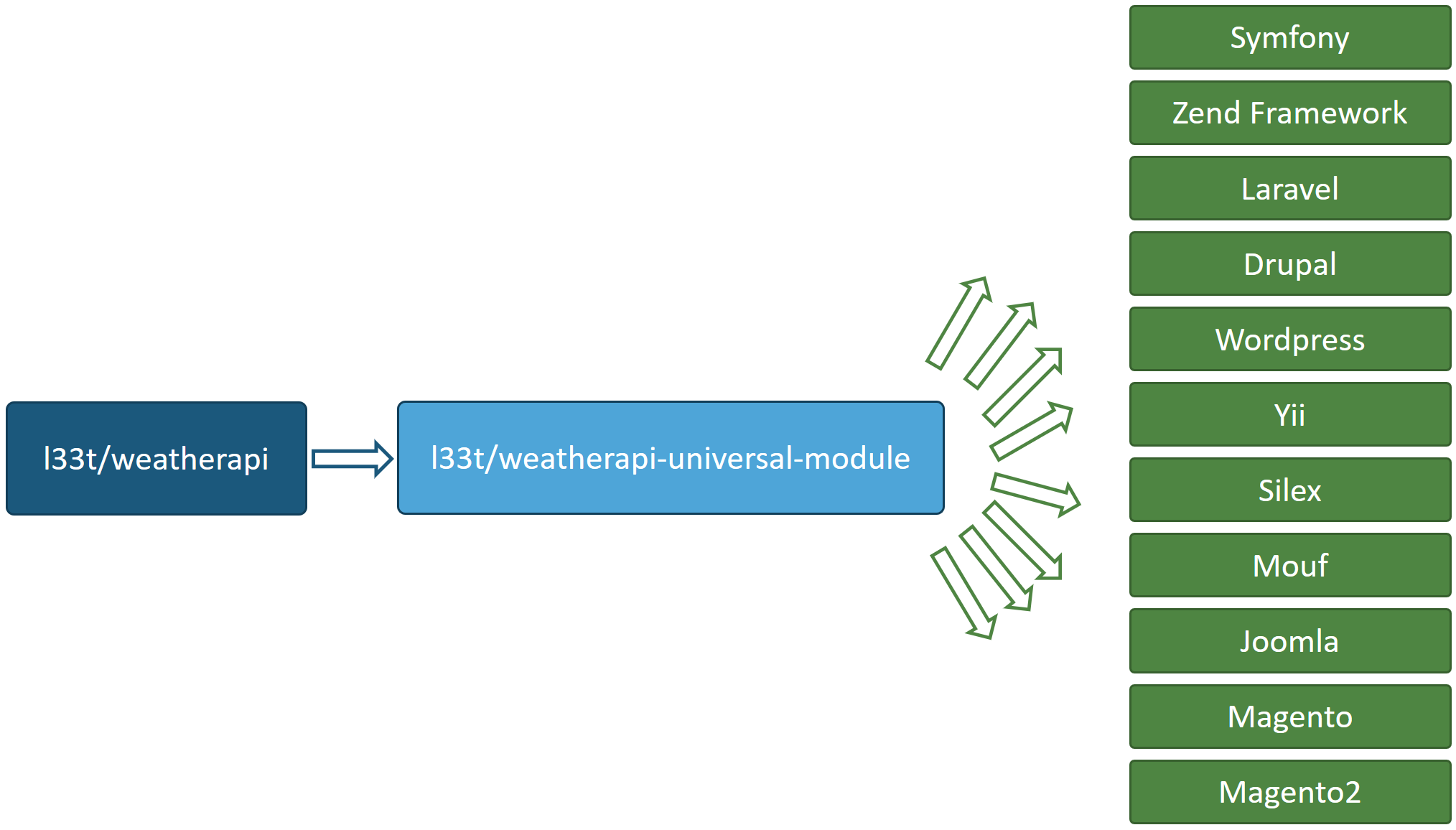] --- class: center, middle, big-text We would need our unique module to be able to able to .highlight1[write in any container] of any existing framework... --- class: center, middle, big-text But all containers are .highlight2[very different]! --- class: center, middle, big-text But all containers are .highlight2[very very different]! --- # Pimple (used in Silex) ```php $container[WeatherApi::class] = function(Pimple $container) { return new WeatherApi($container[HttpClient::class], $container[LoggerInterface::class], $container[CacheItemPoolInterface::class], $container['openWeatherMapApiKey'] ); }; ``` ??? Ok, so this is easy with Pimple. It looks like a setter, so we could simply put a "set" method in all containers? Alas no! There are plenty of cases where writing a setter is not possible (like all compiled containers) And if you have to call "set" for each service in your app, the more services you have, the more you app will slow down => an app with 1000+ services will be very slow if I have to call "set" a thousand times (even if I don't instantiate services on each call!) --- # Symfony **services.yml** ```yml services: weatherApi: class: L33t\WeatherApi\WeatherApi arguments: [@httpClient, @logger, @cache] ``` ??? That's why some containers, like Symfony are "compiled" and configurable via a config file. --- # Mouf .full-width[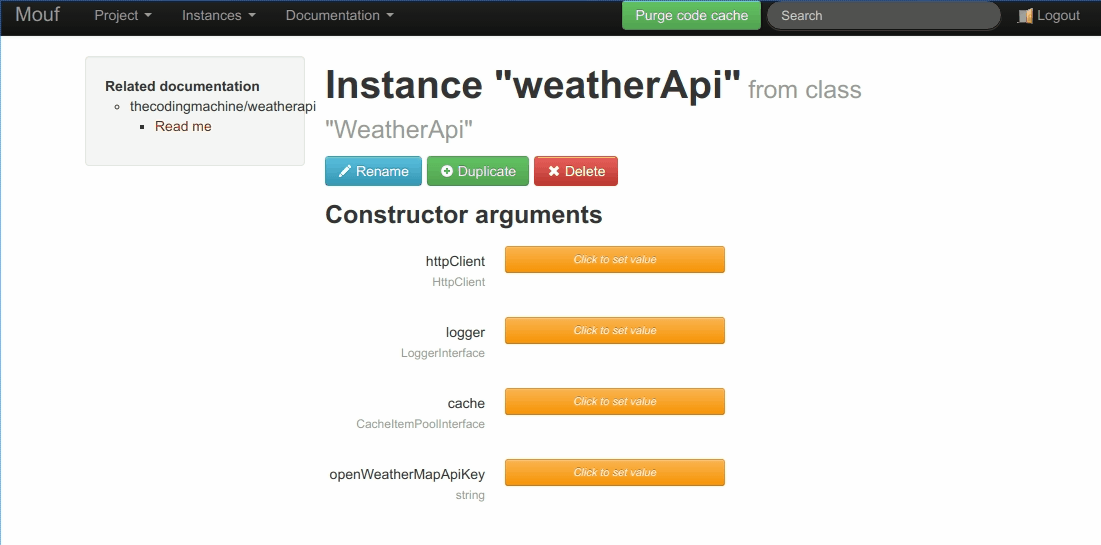] ??? Other containers have other set of features. Mouf, for instance, has a UI (and no "set" method either) The important part is that the way a container is configured is what makes it different from other containers. So we should definitely not standardize this part, otherwise, we are killing what makes each container "special". --- class: center, middle ## So we searched... ??? So we searched... I'm not going to dive in the details, but we first looked for a way to make containers run side-by-side. That way, rather than looking how to add services in a container, you could simply add a new container with the services you want. It does work ok, but there are issues with packages that extend services declared in other packages. Then, we looked for a unified file format to describe seervices (like services.yml, but standardized). But there is the problem of the choice of the format. JSON? (easy but no comments). YML? XML? (powerful, but complex). Even Symfony does not make a choice in the file format by allowing several formats. And having all projects to agree is clearly impossible. XXXX So we said... ok, let's work on interfaces that represent the content of the configuration file (this way, there is no need to choose a format). This idea also kind of works. But it's really hard to describe all possible ways a service can be instantiated. It requires a lot of code and interfaces are complex. So we kept searching, and one day, Matthieu Napoli (the guy that worked with me on PSR-11) got this idea: --- class: center, middle, inverse # Universal service provider --- # *service-providers* A service provider is a class in charge of putting services into a container. **In *Laravel*** ```php class LaravelWeatherApiServiceProvider extends ServiceProvider { public function register() { $this->app->singleton(WeatherApi::class, function ($app) { return new WeatherApi($app->make(HttpClient::class), $app->make(LoggerInterface::class), $app->make(CacheItemPoolInterface::class), config('openWeatherMapApiKey') ); }); } } ``` --- # *service-providers* A service provider is a class in charge of putting services into a container. **In *Silex*** ```php class SilexWeatherApiServiceProvider implements ServiceProviderInterface { public function register(Container $app) { $app[WeatherApi::class] = $app->share(function() use ($app) { return new WeatherApi($app[HttpClient::class], $app[LoggerInterface::class], $app[CacheItemPoolInterface::class], $app['openWeatherMapApiKey'] ); }); } } ``` ??? Do you see the problem? Those service providers are reading from the container to fetch their dependencies. And those 2 services providers are writing in the container. So we need 2 things... one function to read from the container (get) and one function to put things in the container (set). For the get functiton, it's easy, we have container-interop and PSR-11. --- # Fetching dependencies? PSR-11! ```php interface ContainerInterface { public function get($id); public function has($id); } ``` --- background-image: url(images/unicorns.gif) background-position: center background-repeat: no-repeat background-size: contain <br/> <br/> <br/> <br/> <br/> <br/> <br/> <br/> <br/> <br/> <br/> <br/> <br/> <br/> <br/> <br/> <br/> <br/> <br/> <br/> # .center.highlight3[PHP-FIG: frameworks playing together] --- background-image: url(images/war_zone.jpg) background-position: center background-repeat: no-repeat background-size: contain # .center.highlight2[PHP-FIG, early 2016] --- # PSR-11, *what's that*? - An interface for dependency injection containers. - The final result of the `container-interop/container-interop` project. - Started in 2013 on the .highlight2[**FIG mailing list**] and at .highlight3[**Forum PHP Paris 2013**] - Authors: - Matthieu Napoli - David Négrier - and dozens of other participants - **2.400.000** downloads - **387** paquets dépendants - Corner stone of .highlight1[**Zend-expressive**] and .highlight1[**Slim3**] - Absolutely .highlight2[**trivial**] to implement in any container ??? So in order to fetch dependencies from a container, we have an existing solugion! Now for the part on how to "set" dependencies, it's way harder. But couldn't we skip this? Couldn't we find another way to do it? --- background-image: url(images/unicorn_party.png) background-position: center background-repeat: no-repeat background-size: contain # .center.highlight1[PSR-11, in REVIEW!] --- # Proposal Return an *array* of *factories* (i.e. *callables*), indexed by service identifier. ```php class UniversalWeatherApiServiceProvider implements ServiceProvider { public function getServices() { return [ WeatherApi::class => function(ContainerInterface $container) { return new WeatherApi($container->get(HttpClient::class), $container->get(LoggerInterface::class), $container->get(CacheItemPoolInterface::class), $container->get('openWeatherMapApiKey') ); } ]; } // ... } ``` --- # In practice - Project `container-interop/service-provider` - *beta*, do not use in production - Existing consumers (for now): - Symfony bridge - Laravel bridge - Drupal 8 bridge - Simplex (Pimple 3 fork) - Yaco (simple PSR-11 compiled container) --- # In practice .full-width[] --- class: center, middle, inverse # Demo --- # Extending services .large-img[] .center[How can my `Twig_Environment` service know about my `MyTwigExtension`?] --- # Extending services A *getServiceExtensions* method can be used to extend services. ```php class UniversalWeatherApiServiceProvider implements ServiceProvider { public function getServices() { return [ MyTwigExtension::class => function(ContainerInterface $container) { return new MyTwigExtension(); } ]; } * public function getServiceExtensions() * { * return [ * Twig_Environment::class => function(ContainerInterface $container, * Twig_Environment $twig) { * $twig->addExtension($container->get(MyTwigExtension::class)); * return $twig; * } * ]; * } } ``` --- # About service names .full-width[] --- # About service names .full-width[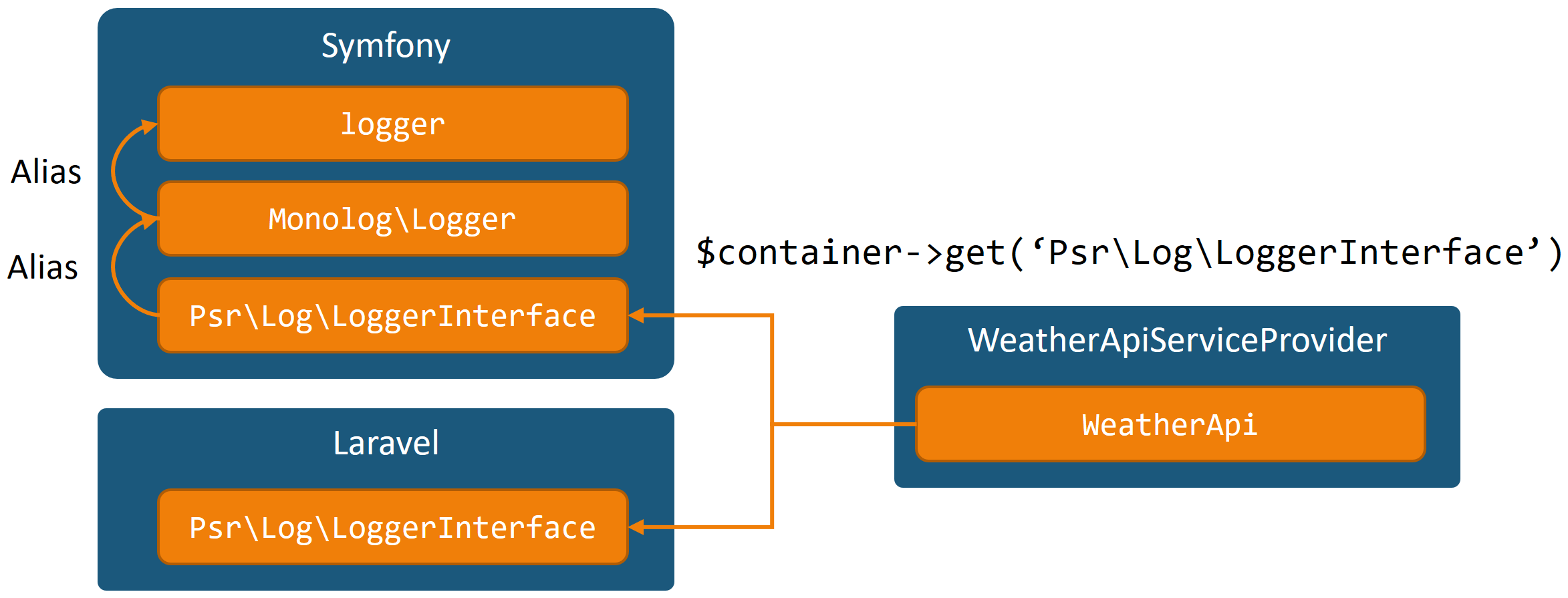] ??? Another solution: - The name of the service should match the *Fully Qualified Class Name* - "Main" implemetation should be aliased to the interface name. So: - *logger* => `Monolog\Logger` - Alias `Monolog\Logger` to `Psr\Log\LoggerInterface` Pros: - Allows compatibility with containers that can do *autowiring* --- # Configuration management ```php class UniversalWeatherApiServiceProvider implements ServiceProvider { public function getServices() { return [ WeatherApi::class => function(ContainerInterface $container) { return new WeatherApi($container->get(HttpClient::class]), $container->get(LoggerInterface::class]), $container->get(CacheItemPoolInterface::class]), * $container->get('openWeatherMapApiKey') ); } ]; } // ... } ``` Configuration can be stored in the container! --- class: center, middle, inverse # Timeline --- # container-interop/container-interop - Already usable - 2,4 million downloads # PSR-11 - Standardized version of `container-interop/container-interop` - Vote in January # container-interop/service-provider - .highlight2[**Beta!**] => v0.3 - Already usable but likely *breaking changes* - *Need help* - Discussions for a PSR in 2017 ??? We need help working on container-interop/service-provider. If you are an author of an open-source package, you can consider writing a universal service provider (warning, moving target, but it's useful to get feedback). Also, you can work on adapters between your preferred framework and universal service providers. Finally, we are looking for all kind of comments! --- class: center, middle, inverse # Conclusion --- class: center # .left[Writing *framework-agnostic* packages] ## Avoid .highlight2[depending on an implementation] (if possible) --- count: false class: center # .left[Writing *framework-agnostic* packages] ## Avoid .highlight2[depending on an implementation] (if possible) ## Be aware of existing and incoming .highlight3[interfaces] (see Cartography, PHP-FIG...) --- count: false class: center # .left[Writing *framework-agnostic* packages] ## Avoid .highlight2[depending on an implementation] (if possible) ## Be aware of existing and incoming .highlight3[interfaces] (see Cartography, PHP-FIG...) ## Today: write a .highlight1[module/bundle for each framework] --- count: false class: center # .left[Writing *framework-agnostic* packages] ## Avoid .highlight2[depending on an implementation] (if possible) ## Be aware of existing and incoming .highlight3[interfaces] (see Cartography, PHP-FIG...) ## Today: write a .highlight1[module/bundle for each framework] ## Tomorrow: use .highlight3[universal service providers] --- class: middle, inverse # .center[Questions?] <table style="margin-left: auto; margin-right: auto"> <tr> <td style="text-align: right; width:50%;"><img src="images/twitter.png" style="width: 5%" /></td> <td style="width:50%;">@david_negrier</td> </tr> <tr> <td style="text-align: right"><img src="images/Octocat.png" style="width: 6%" /></td> <td>@moufmouf</td> </tr> <tr> <td style="text-align: right"><img src="images/joindin.png" style="width: 20%" /></td> <td><a href="https://joind.in/19049">joind.in/19049</a></td> </tr> <tr> <td style="text-align: right"><img src="images/tcm.png" style="width: 35%" /></td> <td>We hire! <a href="https://www.thecodingmachine.com/jobs/">thecodingmachine.com/jobs</a></td> </tr> </table> .center.small[Links: [container-interop/service-provider](https://github.com/container-interop/service-provider/) [PSR-11](https://github.com/php-fig/fig-standards/blob/master/proposed/container.md) [container-interop](https://github.com/container-interop/container-interop/) [thecodingmachine/weatherapi](https://github.com/thecodingmachine/weatherapi/) [demo code](https://github.com/thecodingmachine/forumphp2016demo)] --- # Bonus ## Creating aliases ```php class MyServiceProvider implements ServiceProvider { public function getServices() { return [ LoggerInterface::class => function(ContainerInterface $container) { return $container->get(Monolog\Logger::class); } ]; } } ``` --- # Bonus ## Using *invokable objects* ```php class MyServiceProvider implements ServiceProvider { public function getServices() { return [ // Alias is a class implementing __invoke LoggerInterface::class => new Alias(Monolog\Logger::class) ]; } } ``` --- # Bonus ## Performances Prefer *public static* methods for compiled containers. ```php class UniversalWeatherApiServiceProvider implements ServiceProvider { public function getServices() { return [ WeatherApi::class => [self::class, 'createWeatherApi'] ]; } public static function createWeatherApi(ContainerInterface $container) { return new WeatherApi($container->get(HttpClient::class]), $container->get(LoggerInterface::class]), $container->get(CacheItemPoolInterface::class]), $container->get('openWeatherMapApiKey') ); } } ```